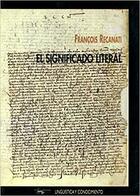
What is pragmatic and what is strictly semantic? The current debate on this question picks up aspects of the one that took place between the philosophers who created formal semantics and the so-called philosophers of ordinary language. This book is a very careful and nuanced defense of the position that 'what is said' is one aspect of 'what the speaker means', and therefore the opposition between literal truth conditions and the speaker's meaning. This is a minority position among philosophers and somewhat more widespread among linguists, but often adopted without sufficient argumentation. Recanati's contribution, presented in an extremely clear and accessible way, is therefore of extraordinary interest to all who are interested in language.










